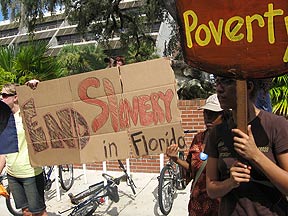 Slavery and sweatshop conditions in Florida tomato fields spark growing outrage in the press; Food industry remains silent about the conditions in which its produce is picked…
Slavery and sweatshop conditions in Florida tomato fields spark growing outrage in the press; Food industry remains silent about the conditions in which its produce is picked…
New articles in the Miami Herald, the Nation, The Week, Glamour magazine (yes, Glamour!…), and Forbes (yes, Forbes! …)
Longtime Miami Herald columnist Fred Grimm was one of several reporters recently to put their disgust at farm labor conditions in Immokalee into writing, as recent developments in the Campaign for Fair Food have sparked a wave of strong media coverage. Grimm was shocked by graphic revelations of abuse in the criminal charge filed recently by federal prosecutors against members of the Immokalee-based Navarrete farm boss family. In his Sunday, 12/16, column, “How about a side order of human rights,” he wrote:
“… The workers trapped on the Navarrete work crew told of a harrowing existence, forced to work for meager wages while accruing charges for two meager meals a day, with extra charges tacked on for beer, soda, even water, until the debits outstrapped their wages.
Quitting was no option. Anyone who attempted to leave the Navarretes, they said, were hunted down, beaten, brought back to the slave house...” Read “How about a side order of human rights” in its entirety here
The Nation magazine also weighed in this week. Quoting the CIW’s Lucas Benitez — “Burger King has allied itself with the tomato industry…to push us back, back toward the same abuse and exploitation we have experienced for decades. But we will not be turned back” — the online version of the Nation adds an excellent article to the growing wave of reporting on the sweatshop conditions in the tomato industry (“Farmworkers and Students Take on Burger King,” 12/14/07).
Meanwhile, Glamour magazine — usually known for its fashion do’s and don’t’s — brought news of modern-day slavery in Florida’s fields to the readers of its December issue on newsstands now. The article begins, “You may consider calories and carbs when ordering a burger — but odds are you don’t worry that the tomato on it might have been picked by a woman or man held in forced labor,” and does a great job of profiling the CIW’s anti-slavery campaign after that.
Finally, John Bowe’s book, “Nobodies: Modern American Slave Labor and the Dark Side of the New Global Economy,” gets more good reviews. The financial news giant Forbes gives the book a thumbs up in its review entitled, “Slaves to Profit,” writing, “Although the plight of the Immokalee workers has been the subject of numerous documentaries and newspaper articles, Bowe’s renewed account adds an unsettling dimension–that slavery has become a crutch for globalized business.” That’s strong stuff — maybe some of the titans of private equity that read Forbes like their bible might want to pay a little attention…
And if you want to read just how horrifying conditions facing workers held against their will can be but you haven’t bought “Nobodies” yet, you can find an extended excerpt in an article entitled “The last word: Our slaves,” in the online version of the new magazine “The Week.” Here’s the introduction: “Involuntary servitude’ still exists in America today, says author John Bowe. A brutal murder in a migrant farmworkers community in Florida shows how that’s possible.”
And as for the shock and outrage from food industry executives at these horrific conditions where their tomatoes are picked, well… it’s kind of hard to find. It’s perhaps best summed up in this quote from Burger King’s own Keva Silversmith, from an 11/25/07 opinion piece by Robyn Blumner of the St. Petersburg Times (“At a penny per pound, a little adds up to a lot”): “Florida growers have a right to run their business how they see fit.”
Yep. If you’re Burger King, “Florida growers have a right to run their business how they see fit.” And that’s our last word.
